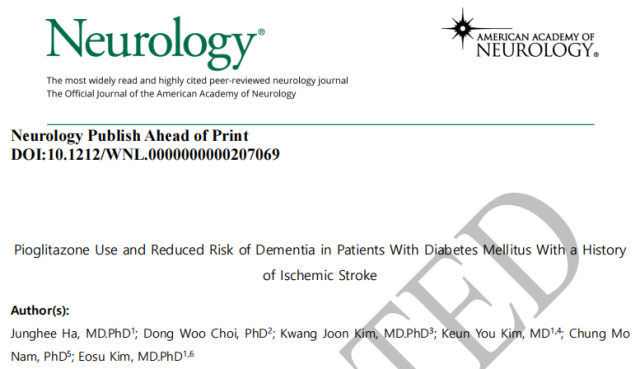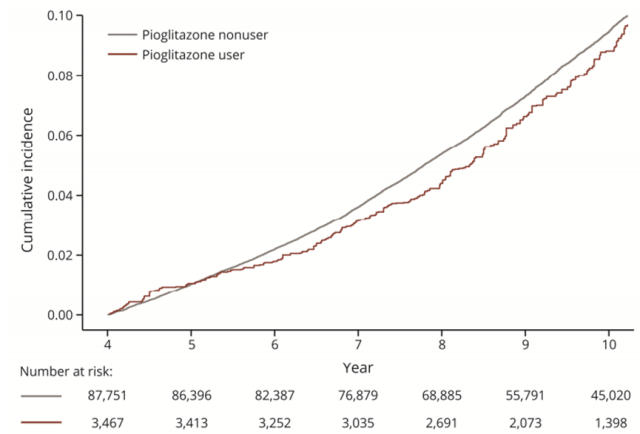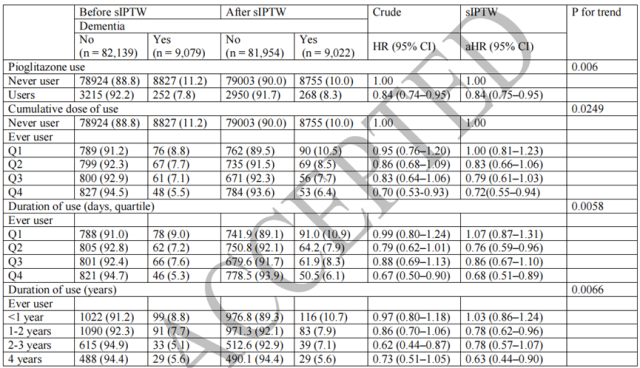Neurology: Classic hypoglycemic drugs may help reduce the risk of dementia!
- Mifepristone: A Safe and Effective Abortion Option Amidst Controversy
- Asbestos Detected in Buildings Damaged in Ukraine: Analyzed by Japanese Company
- New Ocrevus Subcutaneous Injection Therapy Shows Promising Results in Multiple Sclerosis Treatmen
- Dutch Man Infected with COVID-19 for 613 Days Dies: Accumulating Over 50 Virus Mutations
- Engineered Soybeans with Pig Protein: A Promising Alternative or Pandora’s Dish?
- Severe Fever with Thrombocytopenia Syndrome (SFTS): A Tick-Borne Threat with High Mortality
Neurology: Classic hypoglycemic drugs may help reduce the risk of dementia!
- Red Yeast Rice Scare Grips Japan: Over 114 Hospitalized and 5 Deaths
- Long COVID Brain Fog: Blood-Brain Barrier Damage and Persistent Inflammation
- FDA has mandated a top-level black box warning for all marketed CAR-T therapies
- Can people with high blood pressure eat peanuts?
- What is the difference between dopamine and dobutamine?
- How long can the patient live after heart stent surgery?
Neurology: Classic hypoglycemic drugs may help reduce the risk of dementia!
Treatment of type 2 diabetes with pioglitazone is associated with a 16% lower risk of dementia in a 90,000-person cohort study.
With the acceleration of the aging process of the population, the incidence of type 2 diabetes and Alzheimer’s disease (AD) is getting higher and higher, which have become the health killers of the elderly.
However, these two diseases are not two independent diseases. The latest research results at home and abroad show that type 2 diabetes will increase the risk of aging-related cognitive decline and dementia, and the risk of dementia in people with diabetes is average. Twice as many people [1].
Given that type 2 diabetes and AD share common pathogenic mechanisms, such as insulin resistance and microvascular dysfunction , this has prompted researchers to explore the use of antidiabetic drugs to prevent or ameliorate cognitive decline in dementia patients [2].
Pioglitazone, a classic antidiabetic drug, has been found to play a role in both primary and secondary stroke prevention in previous studies [3]. However, in a clinical trial of AD patients without diabetes, no significant cognitive improvement was observed after 18 months of treatment with pioglitazone [4].
A recent large clinical trial also failed to demonstrate its effectiveness on the development of AD in a cohort of non-diabetic participants prescreened for high risk of cognitive decline [5].
That said, a key factor affecting the effectiveness of pioglitazone in reducing dementia risk may be the presence of diabetes in the target population for pioglitazone use.
Recently, Eosu Kim from Yonsei University in Seoul, South Korea, and the National Cancer Center in Gyeonggi-do, South Korea, jointly published the latest research results in Neurology , an authoritative journal in the field of neurology [6].
Their analysis of data on more than 90,000 Korean diabetic patients found that diabetic patients who took pioglitazone had a 16% lower risk of developing dementia compared with those who did not use pioglitazone .
In addition, the association of pioglitazone with a reduced risk of dementia was even stronger among diabetic patients with a history of ischemic heart disease or stroke, with pioglitazone users having a 54% and 43% lower risk of dementia, respectively .

Screenshot of paper homepage
A total of 91,218 new-onset type 2 diabetes patients without a history of dementia, aged 50 years or older, were included in this study from the Korean National Health Insurance Service Diabetes Cohort (2002-2017). Of these patients, 3467 were treated with pioglitazone and 87751 were not.
The mean follow-up time was 3512 days for pioglitazone users and 3736 days for pioglitazone-naive patients.
During this period, the incidence of dementia among pioglitazone users was 8.3% (286 people), compared with 10.0% (8755 people) of patients not using pioglitazone.
Eosu Kim et al. found that in a diabetic population, patients taking pioglitazone had a lower overall risk of dementia than those not using pioglitazone.
Univariate analysis showed that use of pioglitazone was associated with a lower risk of dementia compared with no use of pioglitazone (HR, 0.84; 95% CI, 0.74-0.95) .

Pioglitazone reduces overall dementia risk in diabetics
In addition, Eosu Kim et al. also noticed that pioglitazone reduces the risk of dementia in diabetic patients.
There is a dose-response relationship. As patients use pioglitazone for a longer time, the risk of dementia will also decrease .
Compared with diabetics who did not take pioglitazone, those who took the drug for four years were 37 percent less likely to develop dementia, and those who took it for one to two years were 22 percent less likely to develop dementia.

Pioglitazone reduces dementia risk in diabetics
Considering that there may be other factors affecting dementia risk, the researchers next performed a subgroup analysis to further evaluate the association between pioglitazone and dementia risk.
The association of pioglitazone with a reduced risk of dementia in diabetic patients was more pronounced in diabetic patients with a history of stroke or ischemic heart disease, the researchers found .
Among diabetic patients with a history of stroke, pioglitazone use reduced the risk of dementia by 54% (HR, 0.46; 95% CI, 0.24-0.90); among diabetic patients with a history of ischemic heart disease, pioglitazone Use reduced the risk of dementia in patients by 43% (HR, 0.57; 95% CI, 0.38-0.86).
In conclusion, this study shows that in diabetic patients, the use of pioglitazone is associated with a lower risk of dementia, especially in patients with a history of stroke or ischemic heart disease, suggesting that pioglitazone can be used as a A personalized approach to dementia prevention in diabetic patients with a history of stroke or ischemic heart disease.
However, pioglitazone will produce many side effects such as edema, weight gain, osteoporosis and congestive heart failure during use, so more research is still needed on the long-term safety of the drug in order to determine an optimal dosage It is possible to minimize side effects while exerting therapeutic effects .
references:
[1]Umegaki H. Type 2 diabetes as a risk factor for cognitive impairment: current insights. Clin Interv Aging. 2014;9:1011-1019.
[2]Y archoan M, Arnold SE. Repurposing diabetes drugs for brain insulin resistance in Alzheimer disease. Diabetes. 2014;63:2253-2261.
[3] Spence JD, Viscoli CM, Inzucchi SE, et al. Pioglitazone Therapy in Patients With Stroke and Prediabetes: A Post Hoc Analysis of the IRIS Randomized Clinical Trial. JAMA Neurology. 2019;76:526-535.
[4] Geldmacher DS, Fritsch T, McClendon MJ, Landreth G. A Randomized Pilot Clinical Trial of the Safety of Pioglitazone in Treatment of Patients With Alzheimer Disease. Arch Neurol. 2011;68:45-50.
[5] Burns DK, Alexander RC, Welsh-Bohmer KA, et al. Safety and efficacy of
pioglitazone for the delay of cognitive impairment in people at risk of Alzheimer’s disease (TOMORROW): a prognostic biomarker study and a phase 3, randomised, double-blind, placebo-controlled trial. Lancet Neurol. 2021;20:537-547.
[6] Junghee Ha et al, Pioglitazone Use and Reduced Risk of Dementia in Patients With Diabetes Mellitus With a History of Ischemic Stroke, Neurology (2023).
Neurology: Classic hypoglycemic drugs may help reduce the risk of dementia!
(source:internet, reference only)
Disclaimer of medicaltrend.org
Important Note: The information provided is for informational purposes only and should not be considered as medical advice.



